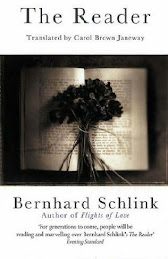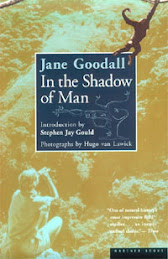I have a lot of reviews on here, and Blogger only lets me list them by date. I thought, "Well that's not very helpful to someone looking for a specific book!" So I decided to list them alphabetically. This list is by book title; at some point I'll also make a list alphabetically by author (can you tell I'm anal rententive???). You can click on each title to go directly to the review. If you're looking for something that starts with "the" or "a," look under the second word. I'll keep this updated as I add reviews.
1984 by George Orwell
Ahab's Wife by Sena Jeter Naslund
The Bell Jar by Sylvia Plath
Blessings by Anna Quindlen
Brave New World by Aldous Huxley
The Curious Incident of the Dog in the Night-time by Mark Haddon
The Diving Bell and the Butterfly by Jean-Dominique Bauby
Finding Angela Shelton by Angela Shelton
Goat by Brad Land
I Know Why the Caged Bird Sings by Maya Angelou
The Kite Runner by Khaled Hosseini
Lies My Teacher Told Me by James W. Loewen
Life of Pi by Yann Martel
The Little Prince/Le Petit Prince by Antoine de Saint-Exupéry
Maybe, Baby by Tenaya Darlington
Meeting Mr. Wrong by Stephanie Snowe
Middlesex by Jeffrey Eugenides
Misconceptions by Naomi Wolf
My Sister's Keeper by Jodi Picoult
The Ocean in the Closet by Yuko Taniguchi
Out by Natsuo Kirino
The Poisonwood Bible by Barbara Kingsolver
The Power of One by Bryce Courtenay
Princess by Jean P. Sasson
A Separate Peace by John Knowles
Three Cups of Tea by Greg Mortenson and David O. Relin
The Virgin Suicides by Jeffrey Eugenides
We Need to Talk About Kevin by Lionel Shriver
Wifework by Susan Maushart
A Wrinkle in Time by Madeleine L'Engle
Thursday, October 22, 2009
Wednesday, October 21, 2009
1984

1984
by George Orwell
This post contains spoilers below the fold.
When I first heard about 1984, I assumed it was a science fiction about the physical and psychological toll inflicted on humans by an over-reaching government system, much like Animal Farm (although, I admit, I read that when I was 12 so I may not have grasped some of the deeper themes). What I didn't expect was a philosophy text, a metaphysical journey, questioning the meaning of truth and reality, and exploring how the human mind can simultaneously believe conflicting things, which Orwell calls doublethink but we know it as cognitive dissonance (although there are differences which Orwell outlines, I found cognitive dissonance the easiest avenue from which to explore the concept of doublethink).
I Know Why the Caged Bird Sings

I Know Why the Caged Bird Sings
by Maya Angelou
I had heard of Maya Angelou's book I Know Why the Caged Bird Sings, mostly referred to as classical American and African American literature, and I was familiar with much of her poetry due to American literature classes in high school. What I did not know is that I Know Why the Caged Bird Sings is an autobiography that was written on a dare. After hearing her life story, writer James Baldwin and editor Robert Loomis challenged Angelou to write it as a piece of literature. Angelou succeeded so exceptionally that some reviewers do not categorize it as nonfiction. Indeed, I was a quarter of the way through the book when I learned this, and had assumed that it was fiction.
Angelou's story begins in the deeply segregated Stamps, Arkansas, where she and her brother live with her paternal grandmother and her uncle. She speaks powerfully to her and her brother's feelings of abandonment as she describes how they were treated as baggage during their journey. A longing for love and acceptance from both of her parents laces throughout the work, and perhaps even intensifies during the periods where she lives with each of them, separately.
A second theme that Angelou weaves throughout her text is the effect of racism on herself and her brother. When Angelou gets a maid job in a white woman's house, she is re-named Mary by the housemistress, who seems to think it is a compliment. She only regains her name by breaking a favorite dish, then being abused and thrown out. The hurt and fear visited upon the child Maya is apparent through her silent defiance, although it becomes more intense as she talks about her brother, Bailey.
The third theme that Angelou's work engages is the misogyny and sexism which deeply impact her childhood. At the age of 8, Angelou was sexually abused and raped by her mother's boyfriend. The fear and confusion she felt is conveyed by her abuse being intensely connected with death. With this connection Angelou draws a powerful parallel known intimately to rape survivors: namely, that rape is a waking death that will always be a part of you. The fear associated with womanhood follows Angelou through the book and this, combined with a lack of education about her own body - in those days talking about women's reproductive parts was considered indelicate for women - results in her becoming pregnant at 16. The book ends as she passes from naieve, fearful childhood to a womanhood where she can trust herself and her body.
I very much enjoyed reading I Know Why the Caged Bird Sings. Angelou not only wove her three themes together masterfully, but did so with lyric, humor, frankness and percipience. When I finished the book I was eager to learn what happened next, and I may dig into the sequels soon, although I have heard this particular volume was her pièce de résistance.
Subscribe to:
Comments (Atom)


